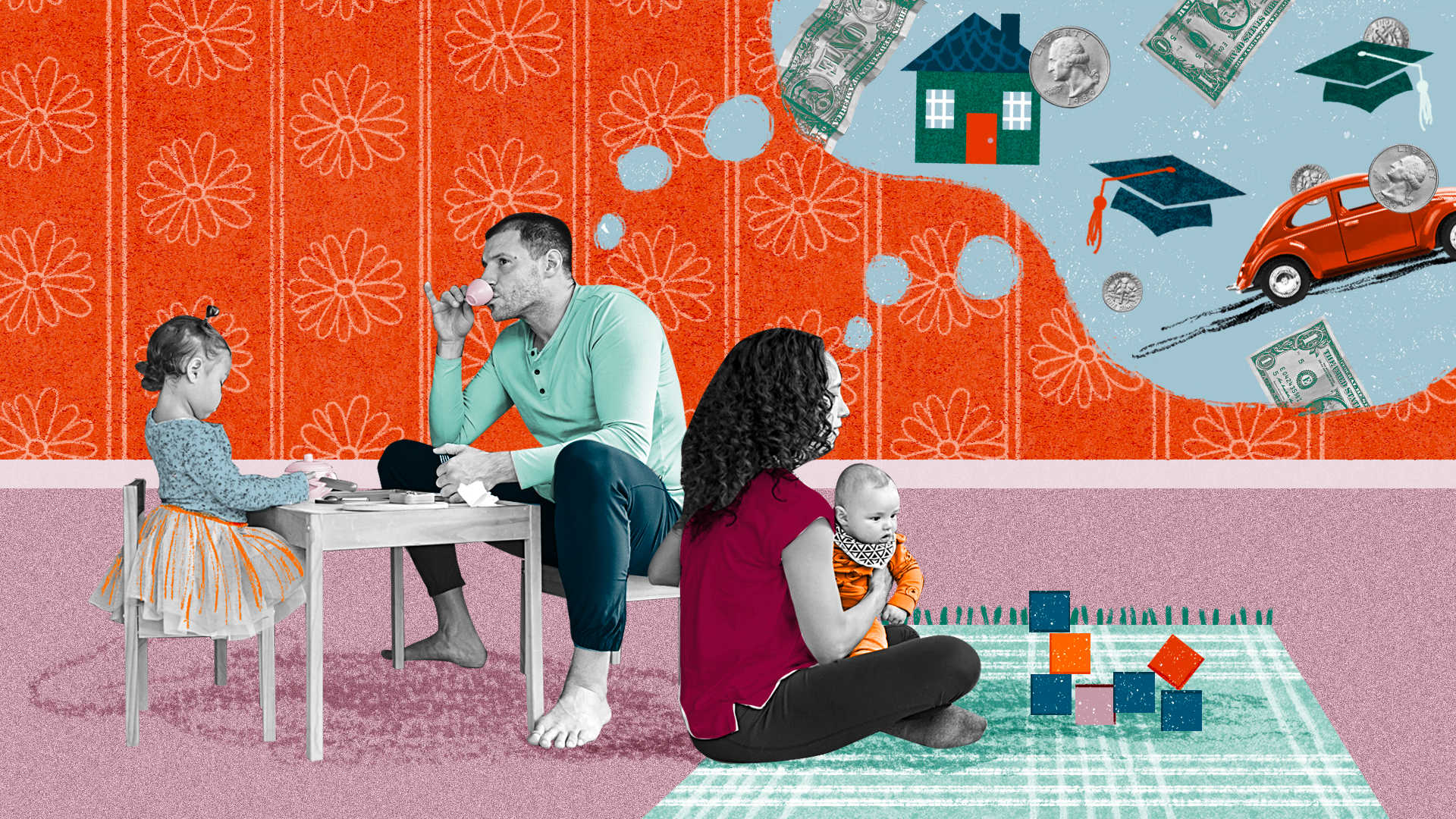Most parents want to provide their children with a childhood that’s at least as financially secure as their own childhoods were. But at the same time, the cost of raising a child has never been higher. Last year, the Brookings Institute estimated that the average American middle-class family will spend $310,605 to raise a child born in 2015 to the age of 17. [1]
Taking these costs into account alongside stagnant incomes, growing inequality, the decline of collective bargaining, and — especially in recent years — rising inflation, it’s no wonder that 30% of American parents say financial pressures are the reason they don’t have more children, according to the 2023 Policygenius Cost of Parenting Survey.
On the other hand, parents who say they are providing their children a more financially secure childhood were more likely to exhibit certain financial behaviors compared to those who say they aren’t. For example, parents in households where at least one adult has life insurance coverage were more likely to say they’re giving their children a more financially comfortable childhood than parents who have no life insurance coverage.
The financial burden of parenting
Parents were evenly split on whether they are providing a more financially comfortable life for their children than what they had themselves.
Parents making $80,000 or more per year were more likely (62%) to say they were providing a more financially comfortable childhood than parents making less than $40,000 per year (40%). However, while Black parents comprised only 8% of those earning $80,000 or more, they were more likely (65%) than white (47%) or Hispanic (50%) parents to say they were providing a more financially comfortable childhood for their children.
Many parents said finances are holding them back from having more children.
30% of parents at least somewhat agree that finances are keeping them from expanding their families. Many parents opted to grow their families in the midst of the COVID-19 pandemic, as they benefited from more flexible working conditions; this may also be in part because the U.S. temporarily increased aid to parents via an expanded Child Tax Credit. However, these policies have ended, and the U.S. remains one of the least generous advanced nations when it comes to financial assistance for child care, pre-K, and paid family leave. [2]
The study also suggests the cost of having children has held parents back from other financial goals. For example, 10% of parents said they would have a bigger house if they didn’t have children.
What parents who say they’re providing a more comfortable childhood for their kids are doing differently
Parents were asked about what financial moves they made to improve their finances after having children. Most parents made some, but not all of the financial moves we asked about, including buying life insurance, buying disability insurance, paying down debt, starting an emergency fund, and drafting a will.
But parents who think they’re providing a more financially comfortable childhood for their children were more likely to have made at least one of the financial moves than parents who think they aren’t.
86% of the parents who think they’re giving their children more comfortable financial lives than they had made at least one of the financial moves, while 42% of parents who think they’re giving their children less comfortable financial lives made none of the financial moves.
Here are the biggest differences between parents in the “more financially comfortable” group and the “less financially comfortable group.”
Purchased disability insurance | 5x more likely |
Hired a financial advisor | 4.5x more likely |
Started an emergency fund | 4.2x more likely |
Started a college savings account, like a 529 plan | 4x more likely |
“People who are more responsible in those areas are people who plan ahead, especially for the unexpected,” says Patrick Hanzel, a certified financial planner and advanced planning expert for Policygenius. “None of these four moves gives you immediate gratification, but they help you prepare for the future.”
Many of these moves are also associated with wealth. But even among parents making less than $40,000 a year, 79% of parents in the “more financially comfortable” group made at least one of the 12 financial moves we asked about, compared to 50% of parents in the “less financially comfortable” group.
Buying life insurance was one of the most common moves overall. “That makes perfect sense,” says Hanzel. “A lot of people think before they have kids, if something happens to them, it’s not going to be a big burden on anybody financially, but if you have a spouse and a child and costs that come with raising a child, you now have a true need for life insurance.”
Leaving a financial legacy
The plurality of parents say they want to leave their children “financially stable” rather than “financially set for life�” after they die. But parents who say they’re providing a more financially comfortable childhood than their own were more likely to say they want their children to be “financially set for life” compared to other parents.
This desire among parents to ensure children are financially set for life after their death fades as children get older. 35% of parents living with children up to age 5 want to ensure they’re financially set for life. But only 17% of parents living with children who are 18 or older feel the same way.
In contrast, only 6% of parents who live with children ages 0 to 5 say they don’t see their children’s financial futures after death as their responsibility. That number rises to 19% for parents living with adult children, showing that parents feel less responsible for financially supporting their children the older they get.
Methodology
Policygenius commissioned YouGov to poll 1,364 adults who confirmed being parents to at least one child. The survey was carried out online from May 4 to May 8, 2023. The results have been weighted to represent all US adults. The margin of error was up to +/- 6.9% depending on the question. Percentages were rounded to the nearest whole number, so some totals may not add up to 100.
About Policygenius
Policygenius, a Zinnia company, is a one-stop insurance platform that makes it easy to compare and buy policies, get unbiased expert advice, and manage an insurance portfolio in one seamless digital experience. Alongside the intuitive enterprise technology solutions and insights offered by parent company Zinnia, an Eldridge business, Policygenius is helping create better end-to-end insurance experiences for shoppers, advisors, and insurers alike — and enabling more people to protect their financial futures along the way.



